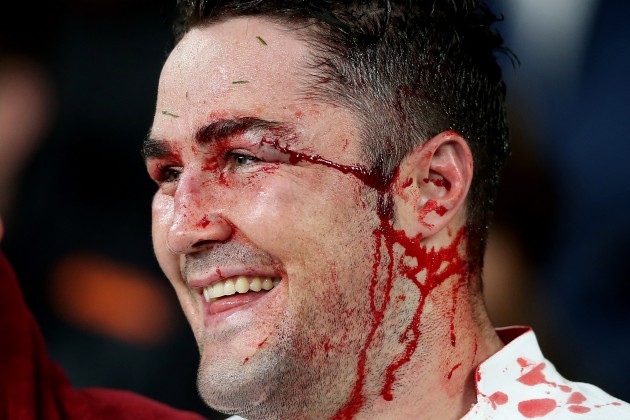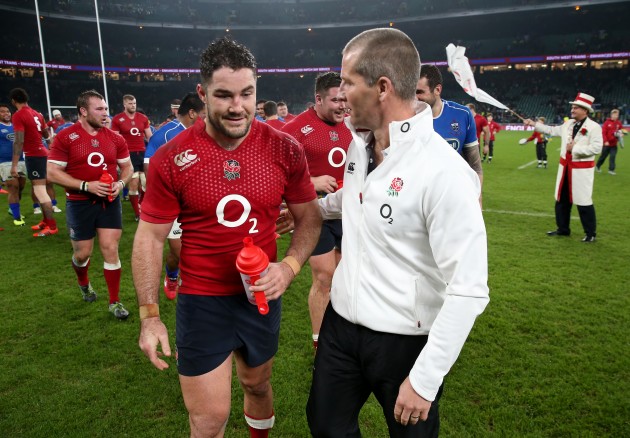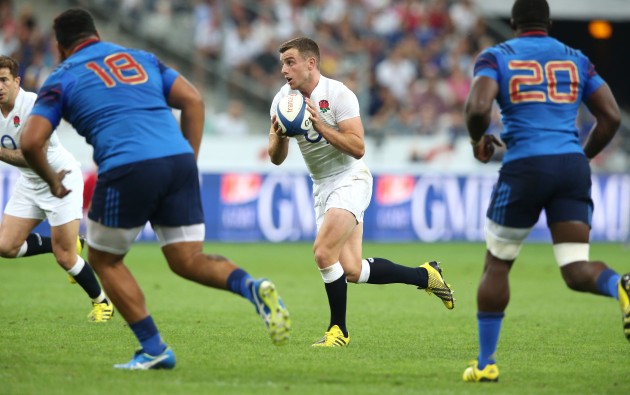He's England's Mr Reliable; brave, unshowy and a low error count but do England need to see more from Brad Barritt over the next seven weeks?
By Adam Hathaway
Stuart Lancaster and Fijian coach John McKee have finally laid their cards on the table for Friday’s World Cup opener and, after all the hot air and speculation of the last ten weeks, it is a relief to have a match that really means something.
There were no bolts from the blue on England’s team sheet but the contribution of Brad Barritt over the next few weeks will be crucial to Lancaster’s chances of following Clive Woodward up the steps at Buckingham Palace for a regal tap on the shoulder.
Barritt has largely been pigeon-holed as a midfield basher who skittle opponents for fun and can truck the ball up up the guts of the defence. It’s a label he’s been sick of for a long time.
Okay, so he’s no Will Greenwood – which Englishman is? – but this is a man who has played fly-half in Super Rugby, and in the Currie Cup, so there must be a footballer in there somewhere.
And England need to see it over the next seven weeks.
The Sharks won South Africa’s Currie Cup in 2008 with Barritt spending most of the season at No 10, something he says has helped him develop into a second pair of eyes for the pivot at 10 when he is playing at 12.
When Lancaster took over as head coach in 2012 he said he wanted two players in his back-line who could act as a ball-playing first receiver.
For his first match in charge at Murrayfield he had Charlie Hodgson at 10 and Owen Farrell at 12 – with Barritt playing 13 in attack and 12 in defence.
The guv’nor also likes having Alex Goode in there somewhere as another receiver who can play a bit of ‘footy’ as the New Zealanders like to say. But with no Goode around on Friday and Farrell on the bench it is down to Barritt to show us what he can do.
Last autumn Dean Ryan used his newspaper column to say that Barritt should be nowhere near the England team.
The Worcester director of rugby damned Barritt with faint praise saying he was a good, honest player but being picked ‘for organisation and solidity is not enough’.
Barritt has already defended his attacking contribution, he was a big factor in the win over New Zealand in 2012 and made the final pass for Jonny May, although the wing had some work to do, against the All Blacks last November, and England need to get some tries on the board during this World Cup. He has also pointed out that his front foot efforts are overshadowed because of what he does when the opposition have the ball.
Obviously England would bite your hand off for seven 3-0 wins on the trot but tries and points difference could be the deciding factors in Pool A.
It is not beyond the bounds of possibility that England, Wales and Australia will all beat each other meaning points, and then tries, scored could be decisive.
This week Barritt told us he wanted England to be the best defensive team at the World Cup, which is all well and good, but they need to get over the try-line as well.
It was looking good in the Six Nations as Lancaster’s team ran in 18 tries – the best return by an English team since Greenwood’s side scored the same number in 2003.
Unfortunately Barritt was not about in the spring as he was laid up with an injury and had to watch George Ford pull the strings as the outside backs made hay.
Ford will need a bit of support in this World Cup – he can’t make every try-scoring opportunity on his own and that has to come from Barritt.
The enduring image of the centre comes from the Australia match last autumn when he walked off after a man of the match performance with his face covered in blood. It was Barritt all over according to the stereotype.
Lancaster could do with the enduring image of this World Cup being a snap of Barritt putting Jonathan Joseph through a gap or nailing a two-on-one to get Anthony Watson over the line.
To see all of Rugby World’s latest subscription deals click here








